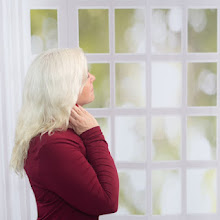Grief, like love, is one of those universal emotions that is shared by all but is also unique to each of us. It is a journey each of us must make on our own. But don't confuse "on our own" with "alone." There is a big difference!
We learn to deal with the grief in our own way. But that does not mean we are alone. Friends, family, counselors, acquaintances can help ease our burden and make it more tolerable and less painful. Think of grief as a 50lb weight we must carry up a steep hill. We are still responsible for getting the weight up the hill, but others may come along and help us carry it.
Overcoming the Burden of Loss
It may feel like the burden is too much.
But the rawness you feel when it happens will lessen. The grief and sadness will change. Rather than being a constant dark cloud, as you heal, it will come in spurts or waves. In between the spurts and waves, you will get some relief and be able to enjoy life again.
It may not feel like it at first, but it does get better.
Last time I discussed some ways to help deal with it: Counseling/Support Groups, Stories, and Photographs. Here I discuss those options a little more as well as some other ideas.
Counseling/Support Groups
This option can give you support, show that you're not alone, and help you see your situation in a new light. This is particularly important if you had a complicated relationship with a person who passed or left. It is also important if your sadness over your situation, such as infertility or disability, causes anguish in your relationships with others.
Stories
The best way to keep those who have passed alive is to tell stories about their life. Also, sharing a story of trauma that you experienced can help alleviate the pain you feel. This is why you see people writing stories and books about their experiences. The task of writing and sharing can be very cathartic.
Photographs
Photos can help preserve our memories. Also, looking at photos can help us experience and process deep emotions and feelings.
There are also many other ways to help heal the grief. Grief is a type of pain. And, just like there is no such thing as a life without pain, there is no such thing as a life without grief. The goal is not to "get rid of it" but to make peace with it. Just as there is the yin and yang in life, there is joy and sorrow, light and dark.
There is an Eastern view that there are two opposite forces, Yin and Yang, that make up all parts of life. "Yin, for example, is a symbol of earth, darkness, passivity. Yang is thought of as heaven. light, activity." **
But while they appear opposite, they are actually complimentary. You can't have one without the other. Life is a balance. Joy and sorrow are similar. And like the Yin and Yang they can coexist together. Just because you face sorrow does not mean joy is no longer a part of your life.
Use Creativity to Heal
This may be the last thing you want to do. You may not feel like doing anything aside from crawl into bed and go to sleep. While it is important to get plenty of sleep and take care of your physical needs, this option can heal your soul. And it can fun at the same time.
Exploring your creative side can promote healing.
"Creative arts therapy is used in treatment for a variety of medical and mental health conditions such as stoke, cancer and depression. The idea behind creative arts therapy is that artistic expression can help people to feel better and motivated to recover and address clinical needs such as reducing anxiety and blood pressure."
*"The American Congress of Rehabilitation Medicine says making or even just seeing art can impact the brain. Whether it’s part of a creative arts therapy exercise, or something you experience in your everyday life, art can help:
Increase serotonin levels.
Increase blood flow to the part of the brain associated with pleasure
Foster new ways of thinking.
Imagine a more hopeful future."
*Write, paint, draw, play a musical instrument, sing, anything creative is a great way to express emotions.
Scientists have been studying the benefits of using your creative right brain. Being creative helps us release and deal with emotions. We can express emotions through creativity that we have difficulty verbalizing or even recognizing. I don't quite understand it completely myself. But because you have to dig deep to come up with a creation, you get in touch with your emotions. The good part is that rather than just thinking about and feeling the emotions, you are using them. Therefore, you have an outlet to express them which alleviates the pain. And, when you are done with your painting, your essay, your song, you have something positive.
It does not matter how "good" it is. Many times, we avoid being creative because we worry what others will think of it and us. We become self-deprecating and embarrassed. So, we avoid exploring this aspect of ourselves. But I believe this is a mistake. It is the process, not your skill, that is important.
Find An Activity for Your Grief
We don't always want to be around other people when we are grieving. If you are an introvert or non-social, you probably have a tendency to be alone anyway. But even social people may choose not to be around others. It can be really awkward because, except for some relatives and close friends, most people may not know what to say or how to act. It seems like the moment you enter the room; it becomes quiet as if your grief will rub off on others. So sometimes you keep to yourself during the initial months of grief; making you feel alone and worse.
Another option is to join a group, club, or organization where you don't have to figure out what to say or even speak about yourself at all. That may sound overwhelming or too much of a commitment. But it really depends on what you join or do. You don't need to join a competitive pickleball league with frequent games and practice sessions. A book club, yoga class, or acting class may be fun without feeling like a part time job.
You have to do what feels right to you when it comes to when to be social and when to take time for yourself. Grief is exhausting and the first few weeks you may find yourself sleeping more. As time passes, you may be more apt to socialize.
Change
Do the same- stay the same. Do you live in the same house as before your difficult divorce? Have you been working at the same stressful job for the past twenty years? Change something whether it be your surroundings or something about your situation.
When we suffer a significant loss, we change. And remaining in the exact same situation or surroundings may not reflect the new us. If the loss has been recent, within the past year, it may make sense keep the changes relatively small. It is not unusual for people to become impulsive and do strange things in the first year or just do things they later regret. Changes can be as expensive and extensive as doing a complete rehaul on the kitchen and bathrooms in your house or as simple as moving furniture around. Perhaps you can change how you dress, the roads you drive on to work or start a new collection.
The one exception to the rule above is if you were already pondering certain changes prior to your loss. Let's say you were considering changing jobs for a while. A loss may be the impetus that makes you take the leap to a new job. Or maybe you were considering moving from the city to a smaller town.
Stuck in Sadness
I consider stuck when you cry every day, and it has over a year since the loss.
Why a year? Granted it is an arbitrary measurement of time and no one's experience is the same. But we have an amazing ability to adapt and find a way to continue in times of hardship. We have an innate ability to survive and keep going. It is in our nature. So, if we have not done so after many months, then something is blocking our path.
This can be for a variety of reasons.
- You just bypassed or came out of the denial phase and the pain hit you look a ton of bricks. You feel paralyzed and have not started to cope or find ways to help you deal with the pain.
- The loss you experienced was traumatic.
- The loss you experienced was complicated. Perhaps you lost your mother, and you had a complicated relationship with her. Or you were in a very messy divorce.
If you have not started treatment or searched out a healthy way to cope, that is something to look into as soon as possible. Besides formal counseling or a support group, some people see their physicians for temporary medication during this time if appropriate.
If the loss was traumatic or complicated, sometimes issues have to be resolved before healing can really begin. You may experience one or several of the following:
- Blaming yourself for the loss
- Anger at how you were treated
- Frustration at not being able to resolve issues with someone before they leave or die
- Experiencing conflicting emotions- you may feel relieved if you are no longer in a toxic situation but then feel guilty for feeling that way about someone who has passed
Next time I am going to talk about how to get unstruck in your grief.
In the meantime, whether you are stuck in grief or just a little stressed, do something creative or join an activity! Life will start to look up! There is a light at the end of the tunnel!









Comments
Post a Comment